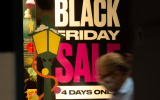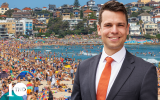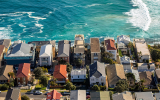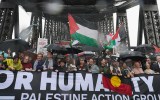
NSW Premier Chris Minns has stood firm in his opposition to the pro-Palestine march that drew tens of thousands of people to walk across the Sydney Harbour Bridge on Sunday.
More than 100,000 people braved heavy rain in Sydney, while there were thousands more at similar rallies in Melbourne and Adelaide.
Dubbed the March for Humanity by organisers, it aimed to highlight what the United Nations has described as the “worst-case scenario of famine” and the 22-month Israeli offensive on the blockaded enclave.
High-profile marchers in Sydney included former Socceroos captain Craig Foster, former foreign affairs minister and NSW premier Bob Carr, and Wikileaks founder Julian Assange. Several NSW government MPs and Sydney Lord Mayor Clover Moore were also among those to march.
The Sydney march’s organisers originally anticipated a turnout of about 10,000 people – ultimately getting about 10 times that.
Minns remained adamant on Monday he had not misread community sentiment in trying to stop the demonstration from going ahead.
“Ultimately, my job is to be on the side of public safety and ensuring people live, work and protest and enjoy a city as big as Sydney,” he said.
“No one should assume it’s open season on the bridge.”
Minns said the state government would review the court judgment that gave the go-ahead to Sunday’s march – and refused to rule out legislative changes to make it harder to organise demonstrations across the Harbour Bridge.
“I think even most reasonable people would expect that, yes, you do have, from time to time, massive demonstrations, even if it’s on the bridge,” he said.
“But knocking it out every week is just not something that we can consider forever.”
Minns praised demonstrators for the rally’s peaceful nature and said the plight of Palestinian civilians was a massive concern to him.
Federal Labor MP Ed Husic, who has been outspoken on Israel’s military campaign in Gaza since his dumping from cabinet after the federal election, said voters had sent a strong message to politicians
“Just as some underestimated the amount of people that would turn up on the bridge, I think Australian politics has underestimated how strongly Australians feel about this issue,” he told ABC radio on Monday.
“This is a moment, a wake-up call, for Australian politics.
“There was a lot of middle Australia there and that’s something that can’t be ignored.”
However, Prime Minister Anthony Albanese said he wasn’t surprised at the turnout.
“Yesterday’s march was peaceful and an opportunity for people to express their concern about what is happening in Gaza,” he said.
“It is not surprising so many Australians have been affected [and want] to show their concern at people being deprived of food and water and essential services. And so the demonstration in a democracy, it is important people be able to express themselves.”
Albanese is reportedly seeking a “phone call” with Israeli Prime Minister Benjamin Netanyahu following the demonstration.
NSW Police praised the peaceful nature of the march, and there were no arrests.
But they said the fluid mobilisation of tens of thousands of people was “perilous”. Protesters were forced to turn around about an hour into the march across the bridge because of what police said was the “risk of injury, due to the huge number of people taking part”.
Geo-located text messages were sent to thousands of demonstrators urging them to turn back to the CBD and later wait in place. A NSW Police spokeswoman said it was the first recorded use of Sydney’s emergency warning system.
Federal Opposition Leader Sussan Ley expressed concern about Sydney being thrown “into chaos for hours”.
“It’s not reasonable that we have protests that shut down a major arterial route. It’s not reasonable that we throw Sydney into chaos for hours and hours, and I just wonder about the people who genuinely needed emergency services and had to wait or couldn’t actually get them,” she said.
Israel’s military campaign began after militant group Hamas attacked Israel on October 7, 2023, killing 1200 people and taking more than 251 hostages.
The ensuing retaliatory bombardment and blockade of Gaza have killed more than 60,000 people, according to the health authorities.
Gaza’s population of 2.1 million people is projected to face high levels of acute food insecurity, including one million people who face emergency levels, according to the United Nations.
On Monday, the federal government announced an additional $20 million to support aid organisations in delivering food, medical supplies and other lifesaving support in Gaza.
-with AAP










